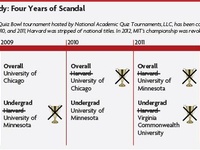“Come on, guys,” he says, hopefully.
Although every player’s laptop is open, none of them consult Google for the answer—to do so would be poor form.
Reluctantly, Morrison surrenders the answer. “It’s Kelo v. the city of New London.”
Despite the restraint shown by the players at practice, Quiz Bowl is a game particularly susceptible to cheating, players say.
And when competitors cheat in this sport, many say, they have an unquestionable advantage.
“You’re pretty much invalidating the entire point of the game by accessing these questions,” Liu says.
“It’s not like Barry Bonds juicing up, because [in baseball] you still have to be a good hitter,” he adds.
Accessing questions before games in a Quiz Bowl tournament, Morrison chimes in, is “like Barry Bonds playing T-ball.”
The whole team laughs, a little grimly.
Harvard’s Quiz Bowl team is not the only squad dealing with the aftermath of a cheating scandal. The same audit that stripped Harvard of its titles also implicated Scot Putzig from the University of Michigan and another player accused of cheating before a high school tournament in 2010, according to NAQT’s March 20 announcement. And in February, NAQT vacated MIT’s 2012 championship win for the alleged transgressions of Joshua Alman, who was accused of exploiting the same security flaw used by Watkins.
The recent public scrutiny has led many in the Quiz Bowl world—a tightly knit community of elite players and organizers who communicate primarily through online forums—to question the values of the game.
“There’s a problem with cheating,” says Andrew Hart, a law student who played on the University of Minnesota team that Harvard defeated in the 2011 championship. “It’s not just database vulnerabilities; there are ways to do it, if you want to.”
In light of these scandals, David Liu, the team’s music specialist, sounds a note of optimism about the future of the Quiz Bowl community.
”I think people will still trust each other, but I think they’ll be more careful,” he says.
Yet in an environment marred by scandal, Hart says, promoting honest competition is more important than ever.
“People take the integrity of the game seriously,” Hart says. “In a sense, it’s all the game has.”
—Staff writer D. Simone Kovacs can be reached at dkovacs@college.harvard.edu. Follow her on Twitter @simkovacs.
—Staff writer Jared T. Lucky can be reached at lucky@college.harvard.edu. Follow him on Twitter @jared_lucky.









